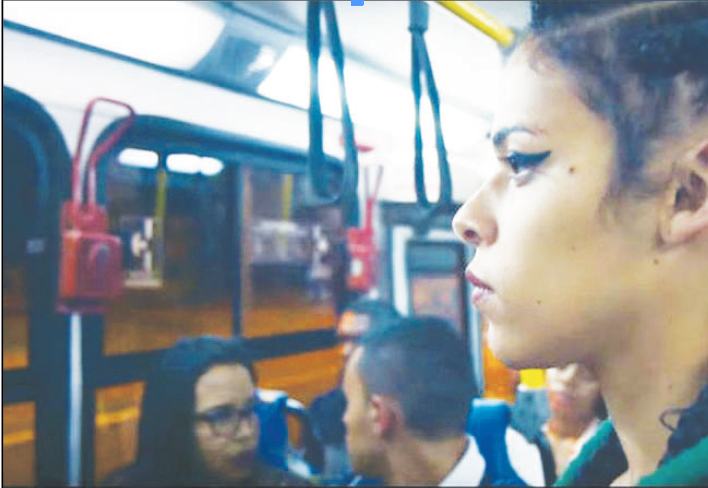
Yaasmeen Piper
Editor-in-Cheif
“What makes me fearful is to walk here as a woman,” says Raquel, one of the leading women in the Brazilan documentary “Chega De Fiu Fiu” which translates to “Enough With the Catcalling.”
“Because I don’t have any way to defend myself.”
The Department of Modern Languages, Philosophy and Religion showed “Chega De Fiu Fiu” as well as two other documentaries as a part of their Latino Heritage Month film series on Sunday, Oct. 20.
The documentary follows Raquel Carvalho, Rosa Luz, and Teresa Chaves as they navigate their way through catcalling. Even though they are living in three different Brazilian cities, their experience with catcalling is almost all the same.
The film starts with Luz, a black, trans artist living in the periphery of Brasilia. As she rides her skateboard with her thick braids and even thicker winged eyeliner, she explains to the filmmakers what pathways are safe and night and which ones she avoids.
“I end up going through the brushwood,” she said, “because otherwise, we’d have to go all roundabout because this city is not made for pedestrians.”
According to Carvalho, a black nursing student and manicurist who lives in Salvador, Bahia, these cities are not made for women because there are limited spaces where they can walk and feel safe.
All three women have identified pathways where they have a decreased chance of experiencing sexual harassment, assault or rape. Carvalho states that there are times men seem to get more aggressive when they spot a woman with more exposed skin. They got even more aggressive when Raquel did not respond.
One woman placed viewers in her shoes to see what it was like to experience street harassment. In a style similar to the viral video titled “10 Hours Walking in NYC as a Woman,” which documents 10 hours worth of street harassment via a hidden camera, this Brazilian woman placed a hidden camera in her glasses as she walked the streets. Only she wasn’t silent.
“Do you need something?” she asked on man as he stared at her.
“No, I’m just looking at you,” he responded.
“Okay, why?” she said.
“Because you’re pretty.”
“Sir, don’t you think that’s disrespectful?” she asked.
“No. When someone is beautiful you have to look at them,” he said.
Even though the faces of these men were blurred, you could still make out the way there were staring at the women, and how they were readjusting themselves to get a look at them.
Luz had a unique experience when it came to street harassment and catcalling. Before she transitioned, she wasn’t started at or followed, at least not as the capacity she gets now. Not only did she feel safer walking the streets, but there wasn’t much to be fearful of.
After she transitioned she started getting harassed more and more. Men would call out things to her, staring at her and sexualize her which forced her to readjust where she walked.
According to Carley Berke of the BU Initiative on Cities, out of 8,000 Brazilian women who responded to the survey, more than 98% of the women surveyed confirmed that they had experienced sexual harassment or assault, and 90% claimed that they did not think what they had experienced was legal.
One of the unique scenes in the documentary was the conversation of street harassment between men. The men discussed whether they believed certain actions such as telling something they were pretty or beautiful counted as harassment and what these actions say about masculinity.
“Heterosexual men, in particular, don’t see a lot the negative aspects because they are not subjected to it,” said Matthew Jones, a sophomore philosophy major at ESU. “So, showing them how it can be detrimental to their perception of themselves would be helpful in getting them to understand why women feel the way they do and why they perceive catcalling as an attack.”
Following the film, Dr. Susana Maitegui of ESU’s Modern Languages, Philosophy and Religion department held a discussion on the documentary. One of the points she brought up was that some of these men do not understand that certain comments are considered harassment.
“In many of these spaces, the men who are confronted on the street by the woman taping aren’t even aware that this is sexual violence,” she said. “I think they feel like they have the right to verbally assault somebody.”
One audience member brought up the fact that street harassment and catcalling is very prevalent in the United States and even on campus. But, how do we fix it?
According to one audience member, we start with education.
“I think it comes down to men being brave: boys talking to their fathers and saying this is what I learned, friends talking to friends and not being scared to chastized because it’s an unpopular opinion,” she said.
Dr. Maitegui has already started the discussion of masculinity and how to treat women with her son.
“I always tell my kids ‘you are going to be a husband and brother-in-law and this is the way you should treat your wife and your children.’ I think they need to be made aware at a very early age.”
The Latino Heritage Month film series is an annual film screening coordinated by Dr. Annie Mendoza of the ESU Modern Languages, Philosophy and Religion department.
Email Yaasmeen at:
ypiper@live.esu.edu

